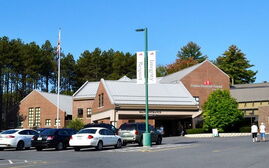Franklin Memorial Hospital turning tree blight into opportunity
 Courtesy / Franklin Memorial Hospital
The red pines that tower behind Franklin Memorial Hospital have become a hazard and will be removed later this month, and the hospital will work with the community to design a landscaping plan to take their place.
Courtesy / Franklin Memorial Hospital
The red pines that tower behind Franklin Memorial Hospital have become a hazard and will be removed later this month, and the hospital will work with the community to design a landscaping plan to take their place.
When the stand of red pines was planted at the Franklin Memorial Hospital site on U.S. Route 2 in the 1940s, the plan was to harvest them for lumber when they matured.
That never happened, and now, more than 70 years later, the trees that tower above the Farmington hospital are in serious decline, blighted by disease and crowding. Harvesting is no longer a choice — it's a necessity. But the Franklin Community Health Network, part of the MaineHealth system, is turning the tree removal into an opportunity.
The most compromised trees were removed in August and the remaining ones will be removed later this month. After the 20 acres of trees are gone, the hospital will partner with the Farmington Conservation Commission and the community on a landscaping plan that will incorporate the young hardwoods that are struggling to grow beneath the pines, as well as the needs of the hospital community.
A 2017 Maine Forest Service forest pathologist’s assessment, as well as subsequent examinations, determined determined that many of the red pines are prone to diplodia tip blight and sirococcus shoot blight, as well as insect infestations by native bark beetles. Since the trees were planted close together and never harvested, it exacerbated the issues.
"As Franklin conservatively monitored the condition of our red pine trees over the past three years, we also received an assessment from a local professional forester that their health is in a state of rapid decline," said Jill Gray, communications director. "Our campus will look much different with all the red pines gone. We wish there were an alternative to this major action, but unfortunately the declining tree health poses a safety threat to our patients, staff and facilities."
FCHN is partnering with the Farmington Conservation Commission to develop a plan to replant portions of the harvested areas that are close to the hospital building. The network is also pursuing a grant from the Maine Forest Service to help with replanting costs.
The network will also solicit feedback from hospital employees and the broader community to design landscapes for the area.
Gray said the wooded area around the campus will bounce quickly, because of the variety of younger hardwood trees growing under the canopy of the tall pines. "As soon as the pine trees are harvested, the sunlight will allow the natural landscape to thrive," she said.
The tree removal will happen as soon as the ground is frozen and has enough snow cover to protect it from the heavy equipment needed, Gray said. The work will also be done over a weekend to minimally impact the hospital’s normal services.
Trees that meet size and quality requirements will be sold to a Maine lumber mill, Gray said. Unusable trees will be reduced to biomass chips and also sold for a nominal amount. The hospital has contracted with a local tree-removal company for the work and money made from selling the wood will pay for the cost of removal.













0 Comments